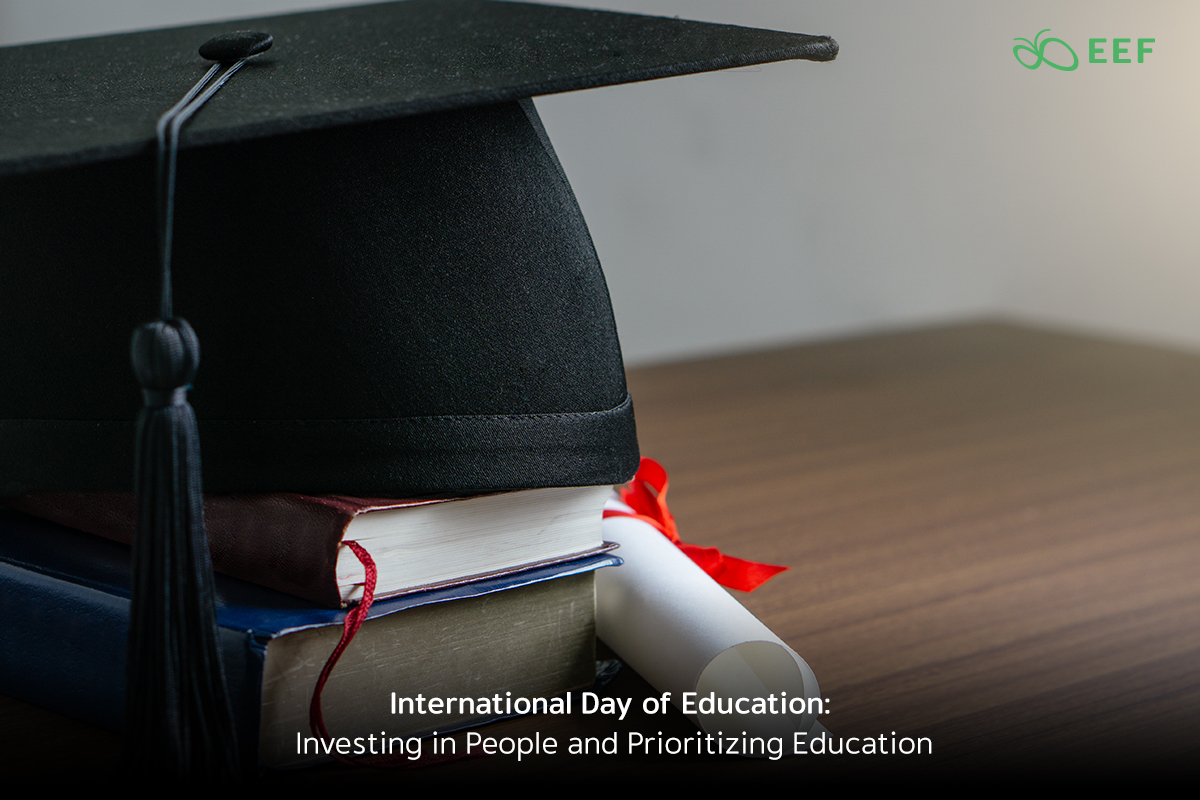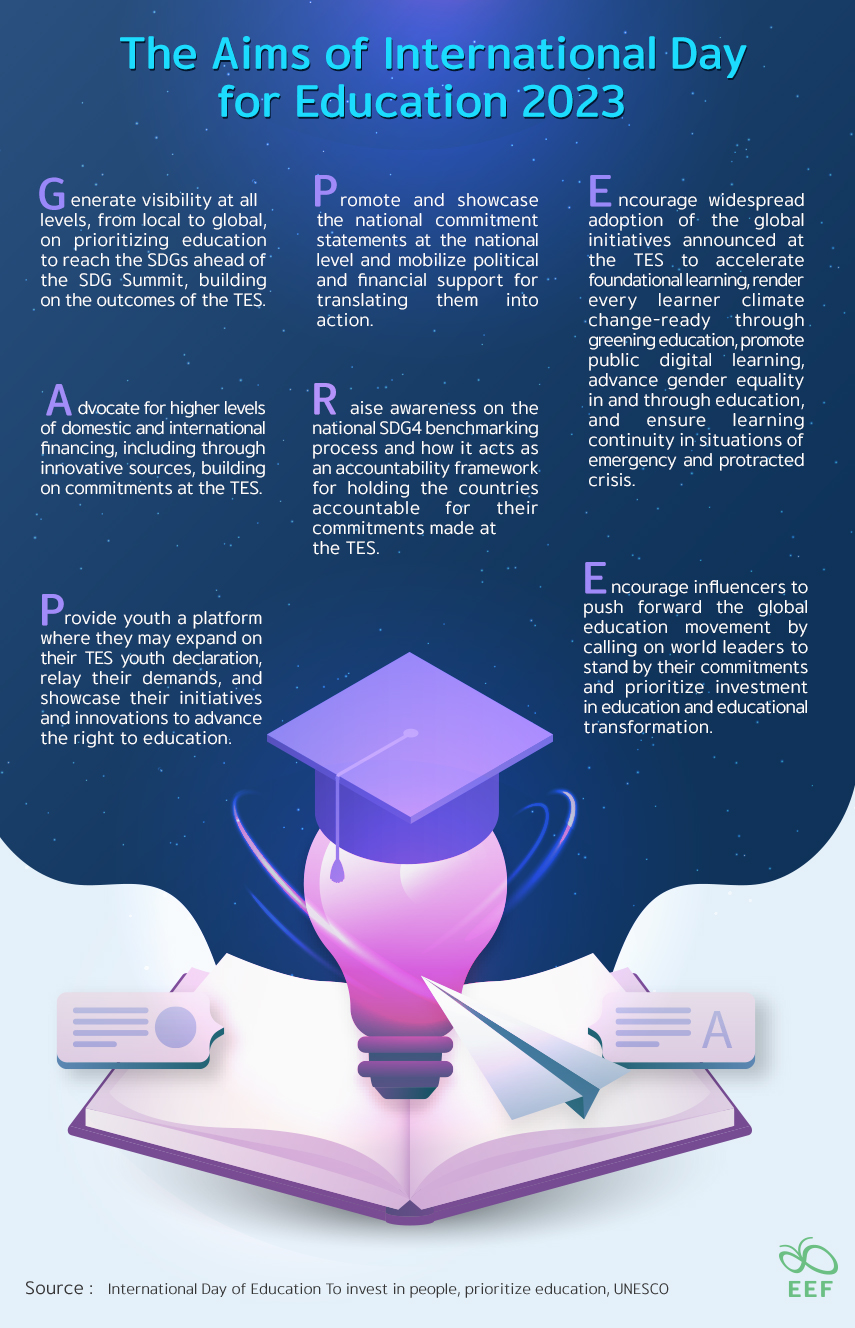
The year 2023 marks the midway point since the UN’s adoption of the 2030 Agenda for people, planet, and prosperity, along with a series of 17 interconnected SDGs, which will come up for review at the SDG Summit in the upcoming September under the theme of “Investing in People.” And to hasten the progress toward all the SDGs in the face of a global recession, widening inequality, and climate change, education must be given a high priority. This year’s International Day of Education (IDE) will call for maintaining strong political mobilization around education and charting the way to translate global commitments and initiatives into action, riding on the wave of global momentum generated by the UN Transforming Education Summit (TES) in September 2022.

The largest of its kind in recent years, the Summit culminated in national commitments
from 133 countries to recovering learning losses brought on by the pandemic and transform their educational systems to make them more inclusive, relevant, and resilient to future shocks, along with six calls-to-action, each with the potential to accelerate change, spanning critical areas: foundational learning, green and digital transition, gender equality, and education in crisis and financing. These national commitments and calls to action are buttressed by a youth movement that co-created the Summit, whose declaration encapsulates all the connections between the critical areas the international community rallied around.
Now that all governments and partners must be held accountable for their commitments, a concrete accountability mechanism is required as they go forward to translate their commitments and initiatives into action and strengthen the capacities of policymakers, teachers, and educators to make education transformative. The mechanism will monitor their transformative commitments in the form of national SDG4 benchmarks and drive tangible progress around the six core themes that arose from the Summit.
However, education remains in a situation of crisis, and it is underinvestment in education that imperils our common future; Six out of ten children at the age of 10 are unable to read and comprehend a simple story, and 244 million children and youth are still out of school. In addition, the number of young people in employment fell by 34 million in 2020, at a higher percentage rate than that of adults. To fulfill the right to education and ensure inclusive, safe, and healthy learning environments, bold action must be taken in the areas outlined in the Secretary-General’s statement: empowering teachers, harnessing the digital revolution for public education, and investing in people more equitably and efficiently. Only by equipping youth for the future can we transform the future.
Building on the momentum of the TES and advancing towards the SDG Summit in 2024, this year’s IDE will therefore push for society-wide engagement to meet our education goals and raise awareness on the six global initiatives to transform education, calling on the governments, international community, and key stakeholders to uphold their commitments to prioritize investment in education and educational transformation to reverse the downward trend on the SDGs and unlock accelerated progress.
IDE 2023 will include the launch of the first annual SDG4 benchmark monitoring publication by UNESCO’s Global Education Monitoring Report and the Institute for Statistics. This publication tracks the country’s progress towards its national benchmarks, including those that capture the commitments made at the TES. Featuring education leaders and champions from across all sectors, both regional and international, it will be a global platform to sustain political mobilization, advance national commitments and global initiatives, and step up public engagement in support of education as the path to peace, sustainable development, and individual and collective well-being.
The Aims of International Day for Education 2023
- Generate visibility at all levels, from local to global, on prioritizing education to reach the SDGs ahead of the SDG Summit, building on the outcomes of the TES;
- Promote and showcase the national commitment statements at the national level and mobilize political and financial support for translating them into action;
- Encourage widespread adoption of the global initiatives announced at the TES to accelerate foundational learning, render every learner climate change-ready through greening education, promote public digital learning, advance gender equality in and through education, and ensure learning continuity in situations of emergency and protracted crisis;
- Advocate for higher levels of domestic and international financing, including through innovative sources, building on commitments at the TES;
- Raise awareness on the national SDG4 benchmarking process and how it acts as an accountability framework for holding the countries accountable for their commitments made at the TES;
- Provide youth a platform where they may expand on their TES youth declaration, relay their demands, and showcase their initiatives and innovations to advance the right to education;
- Encourage influencers to push forward the global education movement by calling on world leaders to stand by their commitments and prioritize investment in education and educational transformation.

Source: https://drive.google.com/file/d/1AsWH28LaWhZmvoF0k_ohuBw2TnhgSjg7/view

